Dental Implants — York, PA
An Ideal Solution for Completely Replacing Teeth
While the immediate impact a missing tooth will have on your appearance and your ability to chew is obvious, it can be easy to overlook the consequences that the jawbone will suffer once the roots that provided it with stimulation are gone. The body will believe that the area is no longer needed and allow the bone to break down. To avoid this issue, Dr. Cyriac is pleased to offer dental implants as a solution for replacing the entire tooth structure and keeping your smile whole. If you have an empty space that needs to be filled or dentures that need an upgrade, call York Smile Care today to schedule a consultation to discuss dental implants in York.

Why Choose York Smile Care for Dental Implants?
- Get Teeth in a Day
- Sedation Dentistry Available
- Entire Implant Procedure Performed Under 1 Roof
What Is a Dental Implant?

An implant is a metal post that has been surgically positioned in the jawbone in order to support a dental prosthetic. The post is placed directly in the jawbone and is hidden by the gums as well as the false tooth or teeth it supports. The goal of implants is to give your new teeth stable support; when they’re anchored to the post, they won’t slip or shift in your mouth when you try to chew food or speak.
The 4 Step Dental Implant Process

The dental implant process requires a number of appointments in our office, which are usually spread out across several months or longer. That might seem like a big time commitment, but the end results will be well worth it! The treatment process can vary from patient to patient, but you can expect to go through four main stages of care: the initial consultation, the implant placement surgery, osseointegration and abutment placement, and restoration.
Initial Dental Implant Consultation
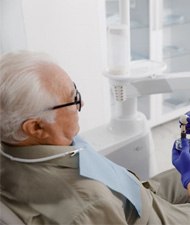
During your initial appointment, Dr. Cyriac will learn about your oral health and medical history in order to determine if you are a good candidate for dental implants. Things like the health of your jawbone, the health of your gums, and other factors will all play a role in determining the course of your treatment. If you are not a candidate for dental implants right away, you may become one after some preliminary treatments, such as gum disease therapy or a bone graft.
Feel free to ask questions during your consultation; our team wants all of our patients to feel confident and well-informed before they commit to anything.
Dental Implant Surgery
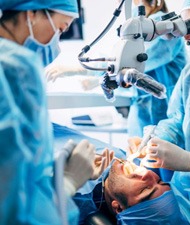
Dr. Cyriac has completed extensive training that qualifies him to surgically place dental implants. Therefore, you will not have to travel elsewhere for a specialist to perform your procedure.
The surgery itself is usually pretty straightforward. Our team will numb your mouth so you will not feel any pain during the procedure. We may also administer sedation. Once you are comfortable, Dr. Cyriac will make incisions in your gums and carefully insert your implants into your jawbone at precise, pre-planned positions. Once the incisions are closed, you will go home and begin your recovery. Most patients are able to return to work within a few days of their appointment.
Dental Implant Osseointegration & Abutment Placement
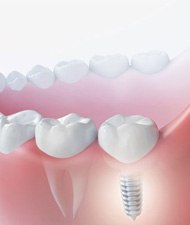
Osseointegration is the biological process through which your jawbone will form a strong bond with your dental implants. It is what will enable your new teeth to be sturdy and stable in your mouth. Usually, osseointegration takes 4 – 6 months.
After adequate osseointegration has occurred, you may need to undergo a second minor surgery. Your implants will be exposed, and healing caps will be placed on them. Later, the caps will be replaced by abutments (small connector pieces that will keep your new teeth in place). Some patients receive abutments at the same time as their initial surgery, so this second procedure is not always necessary.
Delivery of Dental Implant Restorations

To design your new crown, bridge, or denture, our team will take detailed impressions of your mouth, which a dental lab will then use to fabricate your new restoration. Once the lab sends your restoration to us, we will verify that it meets our high standards before we attach it to your implants. Its size, shape, and color should all be a perfect fit for your unique mouth. Once it is in place, you can go off and start to enjoy all the benefits of your new smile!
Benefits of Dental Implants


Before moving forward with your dental implant procedure, our team will walk you through the various advantages you can expect to appreciate from this treatment option. Not only will they provide a more comprehensive solution for rebuilding missing teeth, but they can also benefit your oral health and overall quality of life. Read on to learn how dental implants can create a positive impact on your smile and well-being.
Day-to-Day Benefits

- Easier Maintenance: Instead of needing special dental tools, such as with dental bridges or dentures, dental implants will simply need to be cleaned and taken care of just like your natural pearly whites. This should include brushing every day, flossing at least once daily, and rinsing with mouthwash regularly.
- Improved Biting Power: By integrating with your jawbone, your dental implants will be able to look and function like your natural teeth. In most cases, these titanium posts can help you regain 80% or more of your biting power, allowing you to enjoy most of your favorite foods without worrying about your teeth moving out of place.
- Enhanced Confidence: Since you won’t have to think about your brand-new smile shifting around while eating, speaking, or laughing, you can feel entirely confident in your appearance.
Health Benefits

- Better Oral Health: Dental implants are much easier to maintain, meaning it’s also simpler to keep your smile bacteria-free.
- Greater Overall Well-Being: Your oral and overall health are closely related, as missing teeth are associated with higher risks of serious conditions like diabetes and heart disease. By getting dental implants to restore your bite, you can significantly lower your chances of developing costly complications.
- Jawbone Preservation: Tooth loss typically results in jawbone deterioration because of a lack of stimulation to retain the bone density. By embedding dental implants into your bone tissue, you can effectively maintain your jawbone structure and youthful facial shape.
Long-Term Benefits

- Cost-Effective Treatment: While dental implants typically come with a higher upfront value compared to traditional options, like dental bridges and dentures, they can actually help you save more money in the long run. You won’t have to buy special products to keep your new teeth clean and healthy, and you shouldn’t expect to replace your restorations as often as traditional solutions.
- Long-Lasting Tooth Replacement: Due to their placement in your jawbone, your titanium posts can last decades to a lifetime with proper care. Traditional options like dental bridges and dentures will typically need to be replaced after around 10 years. Dental implants are also incredibly reliable, boasting a success rate of 95% or more even 10 years after being embedded into your jawbone.
Who Dental Implants Can Help

If you have lost multiple teeth, you may be all too familiar with the challenges brought about by missing dentition. Not only does your smile fall short of its aesthetic potential, but you may also find it difficult to thoroughly chew your favorite foods. Additionally, you are at an increased risk of suffering from dental drift and even further tooth loss. What can you do to correct such issues? Dr. Cyriac will be happy to chat with you to discuss your treatment options.
Who Is a Good Candidate for Dental Implants?

Your gums need to be free of infection, and your jaw needs to have enough bone density to carry an implant post. As long as you meet these requirements, you should be eligible for dental implant surgery. The process can change somewhat depending on how many teeth you’ve lost.
Missing 1 Tooth

A single gap can be filled with one dental implant. A dental crown will serve as your new tooth; it will be custom designed so that it matches the color of your other teeth and fits perfectly in the empty space. Keep in mind that it will take some time after implant surgery before the restoration itself is placed. The implant won’t be ready to bear the load of a crown until it has fully fused with the surrounding bone.
Missing Multiple Teeth

We can replace any number of teeth with implants, but the approach we take can change depending on where the empty spaces are located. If you’ve lost teeth in two different locations, you’ll naturally need an implant and crown for each of them. However, if three or more missing teeth were all next to each other before they came out, they can all be replaced at once with a pair of implants and a dental bridge.
Missing All Teeth

Traditional dentures rely on the suction between their acrylic base and your gum tissue to stay in place. That means they may not fit properly if your mouth changes shape as time goes by. You can get four or more dental implants to act as roots for your dentures, ensuring that they’ll stay in place. Some implant-retained dentures are removable, but in many cases, they’ll simply remain in your mouth at all times where you can easily brush and floss them.
All-on-4/Teeth-in-a-Day

Teeth-in-a-Day or Same Day Teeth is a great option if you have failing dentition or missing numerous teeth or no teeth at all and wearing an ill-fitting denture and suffering from it. After a thorough examination and CBCT scan study depending on bone volume Dr. Cyriac will place 4 to 6 implants per arch and a fixed dental bridge is screwed onto the implants on the same time/day. With the All-on-4 approach, you can enjoy a complete smile on the same day as the surgery. By placing the four implants at specific angles so that they fuse with the areas of the jaw where the density is highest, they’ll be able to support an entire arch right away.
All-on-6 Dental Implants

All-on-6 dental implants are similar to All-on-4 implants, except 6 implants are placed in the jaw instead of 4. Dr. Cyriac recommends this depending on availability of bone volume, this more implants increased strength to the arch of teeth being placed. Precise planning needs to be done to position the implants correctly for the optimum fit. Once they are placed, the teeth are then mounted on the implants. The first set of teeth are generally provisional while the implants are healing and fuse to the bone. Permanent option usually done any time after 6 months. The teeth are strong and natural-looking and feel natural.
Understanding the Cost of Dental Implants

Will you need one implant or several? What kind of restoration is needed? Are you getting traditional implant dentures, or do you want to undergo the All-on-4 procedure? Will bone grafts or a sinus lift be necessary? These questions and more need to be answered before we can figure out the final price of your treatment. When considering the cost of dental implants in York, it’s helpful to remember that they are a long-term investment in extremely durable, high-quality new teeth. Plus, our practice offers financing and special pricing to help you afford your restored smile.
Preliminary Treatments & Dental Implant Surgery

Many patients require preliminary treatments, such as tooth extractions or a bone graft, before they can get dental implants. Each of these services comes with its own price. Your implant placement surgery will have a separate fee, which depends on how many implants Dr. Cyriac is placing and other factors. Since the team at York Smile Care handles the surgery in-house, you will not have to worry about dealing with the pricing structure of an unfamiliar implant dentist in York.
The Parts of Your Dental Implant

Each dental implant treatment is customized to a patient’s needs. There are different types of techniques that may be used, as well as a variety of types of implants. Implants can also come from different manufacturers. Additionally, your restorations come with their own price; a multi-unit bridge logically costs more than a single crown, while a full denture is likely to incur the biggest cost. All of these factors have a bearing on the total price of dental implants in York.
How Dental Implants Can Save You Money

Although dental implants present a significant upfront cost, they may actually save you money in the long run. This is possible because implants have the potential to last a lifetime, while traditional methods of tooth replacement may need to be replaced every 5 – 10 years; their price can seriously add up over 20 or 30 years! Many people find that if they calculate implants’ cost per day over a few decades, they are more affordable than a daily trip to a gourmet coffee shop.
Does My Dental Insurance Cover Dental Implants?

Dental insurance policies vary greatly in their approach to dental implants. Some classify implants as a major service and provide partial coverage, while others provide no coverage at all. You will have to check your specific policy to see how it applies. Our team will be happy to help you file claims and use your coverage to your greatest advantage. Even if your insurance does not cover the implants themselves, it is likely that it will cover a portion of the cost of your restorations or your preliminary treatments.
Making Dental Implants Affordable

In addition to helping you navigate your insurance, we offer a few provisions to help you afford your new smile:
- Low-interest financing through CareCredit. CareCredit is a third-party lender that offers flexible payment plans.
- Promotional pricing. We periodically offer fantastic deals on dental implant services. For example, you might be able to enjoy a FREE consultation , or you might get your first single dental implant at a significant discount.
3D CBCT Scans for Implant Placement
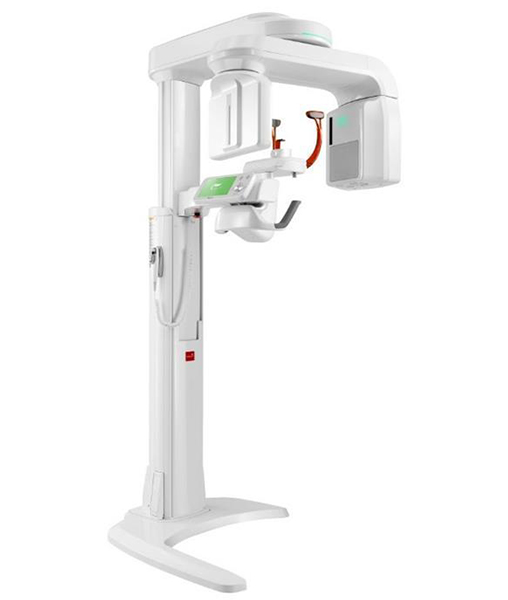
Successful dental implant surgery relies on very careful placement of the dental implant posts in the ideal spot. To aid this process, Dr. Cyriac will use dental cone beam computed tomography, or CBCT for short. It creates a 3D image of the mouth that provides us with far more information about the teeth, jawbone volume, sinuses, and nerves than a regular X-ray could. This also helps us identify potential complications so that we can avoid them.
Advanced Dental Implant Procedures

Our team at York Smile Care wants all our patients to have access to the best treatments. While you may not be a good candidate for dental implants from the get-go, that doesn’t mean you can never get them. We can help you get ready for your new, complete set of teeth with advanced dental implant procedures! Not only will these treatments extend your timeline, but they’re essential for the long-term success of your implants.
Bone Grafting
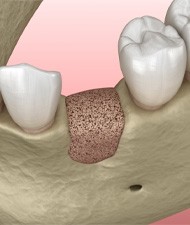
To improve the odds of a successful implant procedure, it may be necessary for us to add some bone density to the jaw if it has deteriorated due to tooth loss, gum disease, or injury. If we place bone tissue taken from another part of your body into your jaw, the surrounding bone will start to regrow. After a few months, it should be possible to perform the implant surgery as long as the mouth has completely healed.
Sinus Lifts
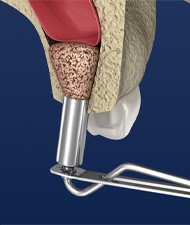
A sinus lift is a very special kind of bone graft performed at the position of the molar and premolar teeth in your upper jaw. In addition to adding bone density, the procedure is meant to lift the sinus membrane so that there’s enough room for the grafting material as well as the implant post. We may suggest a sinus lift if your upper jaw has deteriorated, but sometimes, it may be necessary if you simply have a large sinus cavity or a thin jawbone.
Platelet-Rich Fibrin

At York Smile Care, Dr. Cyriac uses PRF for most of his bone grafting and sinus lift procedures. Platelet Rich Fibrin (or PRF) is a derivative of the patient’s own blood. Blood is rich in platelets, and it contains growth factors which helps in wound healing and tissue generation. This property of PRF helps in faster wound healing and bone regeneration. We draw a small amount of your own blood (20 to 60cc) and before it coagulates immediately centrifuged for about 10 minutes which separates the platelets and red blood cells. This procedure helps accelerate overall healing, as well as helps the success of bone grafting and tissue regeneration at the surgery site.
Dental Implant Post- Op Instructions

After your dental implant placement surgery, you’ll get to begin your recovery. Don’t worry — most patients are feeling well enough to return to work within a day or two. As long as you follow the post-op instructions from your implant dentist in York, Dr. Cyriac, your chances of running into a problem are minimal. Of course, we urge you to contact our practice with any questions or concerns.
Here is a brief explanation of what you can expect after your surgery:
What to Do Directly After Dental Implant Surgery

In the first day or two after your surgery, you should get plenty of rest and avoid intense physical exertion. You also need to take some steps to protect your surgical sites. For example, it is important that you do not disturb the blood clots that are forming where the implants were inserted. To protect them, you should:
- Avoid smoking
- Do not spit
- Do not use drinking straws
- Resist any temptation to touch the surgical sites with your tongue or fingers
Common Side-Effects

During your recovery, you can expect to experience some swelling, intermittent bleeding, and general discomfort. These are relatively mild for most patients and are easy to manage if you properly follow your dental implant post-op instructions in York. You should:
- Take painkillers as directed.
- Apply gauze with light pressure to control bleeding.
- Use ice on your face to control swelling. Apply it for 20 minutes at a time, and then wait 20 minutes before applying it again.
If any of your post-op side effects seem unusually severe or do not begin to subside after a few days to a week, call our practice to request an appointment to address the situation.
Diet Guidelines After Surgery

The first few days after you receive your dental implants in York, it’s best to stick to a no-chew diet. Things like mashed potatoes, yogurt, ice cream (without hard add-ins), pudding, and applesauce are all acceptable choices. Later, you can graduate to a fork-tender diet, which includes things like soft breads and pasta. Depending on how many implants you received, you will eventually be able to resume eating most foods, but it would be best to avoid especially crunchy and hard foods until after you receive your permanent implant restorations.
Health & Oral Hygiene

You should stick to your oral hygiene routine during your recovery, but be very careful that your toothbrush doesn’t irritate your surgical sites. Rinsing with warm saltwater two or three times each day can help to keep swelling and discomfort to a minimum. If you have a prescription mouth rinse, be sure to use it as directed. However, you should avoid the use of mouthwashes with a high alcohol content, such as Scope or Listerine.
What to Do After Your New Teeth Are Attached

After your permanent restorations are attached to your implants, you might experience a bit of soreness in your gums, but this is easy to manage to pain medication. It is unlikely that you will notice any bleeding or swelling. You will soon be able to enjoy all the wonderful benefits of your new smile!
Maintaining & Caring for Your Dental Implants

As soon as you get your new teeth, your days of taking care of your mouth are behind you, right? Wrong! If you want your dental implants and your complete smile to last for decades, you need to take good care of them and make wise lifestyle decisions. Traditional dentures require special care instructions, but fortunately, caring for implant-retained prosthetic teeth looks exactly like maintaining natural ones.
Make Oral Hygiene a Priority

Your new prosthetic teeth cannot become infected with tooth decay. However, your gums can still get infected by inflammation-causing bacteria. To prevent this from happening, you need to continue brushing and flossing every day—just as you should have before with real teeth! These little habits stop plaque buildup, especially around the gumline, and keep bacteria from being allowed to sabotage your restored smile.
Eat a Healthy Diet

A major influence on the microbiome in your mouth is the food you eat and the beverages you drink. Nutritious foods can help balance oral acids, encourage salivation to rinse debris and plaque away, scrub your restorations of other foods, and help your immune system fight infection. On the other hand, sugary and starchy substances, in particular, can increase the acidity in the mouth, encourage harmful bacterial growth, and increase your chances of a damaging infection. Indulging every now and then is okay, but you need to make healthy choices in your diet to help your implants and your mouth stay strong.
Break Bad Habits

Do you smoke or vape? Do you bite your nails? Do you use your teeth to open bags or other plastic packaging? These habits aren’t just dangerous for tooth enamel. They can also shorten the lifespan of your implants and damage your jawbone, which supports implants. Right now is the perfect time to do everything you can to end these habits. Ask your loved ones to help you stay on track with your goals or seek out a support group for additional help.
Protect Your Dental Implants

If you actively play a sport where a hit to the face might happen, your dental implants are at risk of failure. A hard, sudden blow to the mouth could break the strong hold and cause your implants to come out. As a result, you should wear a mouthguard to protect your restored smile.
While you sleep, you may grind your teeth unconsciously. In this situation, wearing a nightguard can keep your teeth from exerting too much force on each other and keep them from stress and damage.
Schedule Regular Dental Checkups

Even if all your teeth have been replaced with dental implants, regular dental visits need to continue. Implant failure often occurs over time, and meeting with Dr. Cyriac about every six months ensures that he catches the problem as early as possible. As a result, we can greatly reduce the risk of failure and enable you to enjoy your implants for many years to come!
Dental Implant FAQs

It’s completely understandable if you have questions about the dental implant process and what to expect from it. During your consultation, feel free to ask Dr. Cyriac about anything that is on your mind; he will be happy to take time to address any concerns you have. In the meantime, though, we invite you to check out the following list of FAQs.
How Can I Choose the Best Implant Dentist in York?
Many dentists place and restore dental implants, but not all of them are equally qualified. Dr. Cyriac stands out amongst his peers for his extensive experience with dental implants; he has placed more than 2,000 of them! He is also a member of American Academy of Implant Dentistry (AAID) and the International Congress Oral Implantologists (ICOI). With his advanced training and the leading-edge technology in his office, he is able to deliver consistently superior results.
Are There Any Downsides to Dental Implants?
The advantages of dental implants far outweigh any disadvantages. However, like any procedure, there are a few cons to consider. For example, dental implants present a higher upfront cost than other forms of tooth replace (although they may be less expensive in the long run). Also, you will have to undergo a minor surgery, and no surgery is completely free of the risk of complications. When you attend your consultation, Dr. Cyriac will be upfront with you if you are considered a high-risk patient for any reason.
How Long Do Dental Implants Last?
With proper care, dental implants in York have the potential to last a lifetime. That is because they fuse with the bone around them (a process known as osseointegration). They are designed to be a permanent solution to tooth loss. The restorations on top of dental implants (crowns, bridges, and dentures) may also last for many years.
How Can I Prevent Dental Implant Failure?
Dental implants are successful in over 95% of cases. Rarely, though, they fail. The most common cause of dental implant failure is an infection known as peri-implantitis. When bacteria attack the tissue around an implant, it can lose its base of support. Fortunately, thorough oral hygiene and regular dental care are usually able to prevent peri-implantitis. By brushing twice a day, flossing once a day, and visiting a qualified dentist at least a couple times each year, you can drastically reduce your risk of implant failure. You should also avoid the use of tobacco in all its forms.
I Need a Checkup & Cleaning I Need a Dentist for My Child I am Concerned About Snoring/Sleep Apnea I am in Pain & Need Help I Have a Cavity or Broken Tooth I am Missing One or More Teeth I Want a Straighter Smile I Want to Enhance My Smile I am Nervous/Afraid of the Dentist View Our Services

